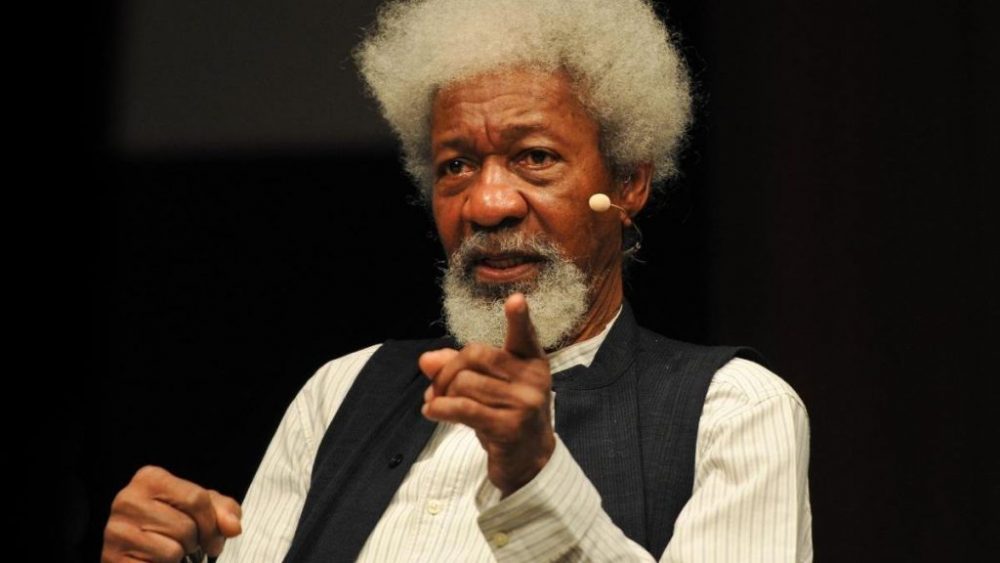Soyinka calls for the decentralization and restructuring of Nigeria

Prof. Wole Soyinka – the Nobel Laureate has again called for the decentralization and restructuring of Nigeria as a long-term solution to some of the country’s challenges, The Punch Newspaper reports.
Soyinka made the call while speaking at the 2021 Obafemi Awolowo Lecture titled, ‘Whither Nigeria?’ organized by the Obafemi Awolowo Foundation.
He said: “There is a consensus that this country whether in terms of governance, economic relations, security, educational policy, cultural policy, etc, requires restructuring. Even the word ‘restructuring’ has been restructured in many directions, in cogent expression which will mean the same thing for everybody.
“For me, for instance, I emphasized decentralization, reconfiguration…We all know what we have now is not working, it’s obvious and we can’t continue along the same line and say that it will work, it is a sign of madness.
Many experts have argued that Nigeria needs to be decentralized with certain powers shifted from the president in Abuja to the 36 state governors in their various states. Soyinka seems to have bought into this idea saying: “I want to make a plea to all governors, stop being so timid. Push this federal envelope as far as it can go, even while we undertake the technical aspect of restructuring whether in terms of dialogue, evolving the constitution or whatever, something has to go on, after all, we’ve had so many of these confabs.
“My plea is to governors to start with: You are charged with the immediate responsibility of the welfare of your own people in whatever term and if you study the constitution carefully, I have done this with lawyers, and it seems that a lot can be done at this moment.
“You need a season of greater autonomy for your own states and that is what I mean by pushing the federal envelope as far as it can go even with this impossible document that we have to cease what power, what authority you can derive from the constitution.
The elder statesman further knocked the state governors accusing them of being too timid. “Consult with your lawyers, I have consulted with mine and they also expressed the view that the governors are too timid, there is too much-centralized mentality embedded in their minds and they are afraid to come out of their cocoons.
“Please remember that your primary responsibility is not the center but the people, the state. So, take in your hands any form of authority that you can even from this constitution as it stands while we are working on a more honest, a more people-oriented constitution.”
What will restructuring actually mean for Nigeria?
Currently, Nigeria is a federal republic modeled after the United States, with executive power exercised by the President. The President is also the Commander-in-Chief of the armed forces, which means the President has complete control over the country’s security architecture.
Furthermore, the federal government controls the country’s natural resources including the oil in the Niger-Delta zone of the country, the mainstay of the Nigerian economy.
Restructuring, at least according to the leading voices on the debate is to have independent self-sustaining federating units. This means allowing each state to have and control its own police force.
The second major part of restructuring is to allow each state to control its natural resources and make contributions to Abuja to enable the federal government to pay for the military, national sports teams, diplomacy among others.
‘We must devolve more powers and resources from the federal government and de-emphasise federal allocations as the source of sustenance of states.
‘We need to start producing again and collecting taxes to run our governments in a more sustainable way with greater transparency and accountability.’ MR Akin Osuntokun, Political Adviser to former President, Chief Olusegun Obasanjo, and a former Managing Director of the News Agency of Nigeria, NAN told Vanguard as his definition of restructuring.
Problems with restructuring Nigeria
Restructuring Nigeria will be a very complex undertaking for any politician. States that have no oil are very unlikely to agree to it as it would mean they would lose their monthly allocations coming majorly from the oil fields in the Niger-Delta.
Only 9 out of 36 states are listed as oil-producing states in Nigeria. The remaining 24 states will have to find alternative sources of funding their budgets, although these states have an abundance of other natural resources besides crude oil.
The second problem with restructuring is that some proponents do not embrace the idea of the current 36 states forming federating units. Some have argued that the country should revert to the 12 states created by the former military ruler, Yakubu Gowon.
‘We already have geo-political zones. Why don’t we have say 6 or 8 Regions from that template, enable the Regions to exercise the functions presently being exercised by the FGN in the various States & co-ordinate such functions & utilize economies of scale.
‘Each Region should be at liberty to create more States in their region as their constitution stipulates.
‘Minority rights will be entrenched in the Federal Constitution to protect minorities in the Regions & enable them to evolve into States’ CHIEF Supo Shonibare, a chieftain of the pan-Yoruba socio-political organization, Afenifere told Vanguard.
